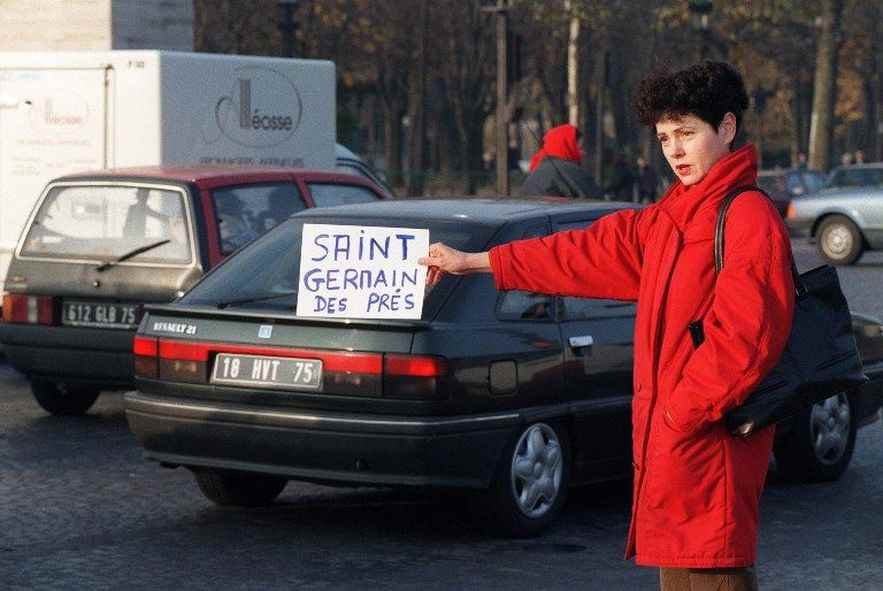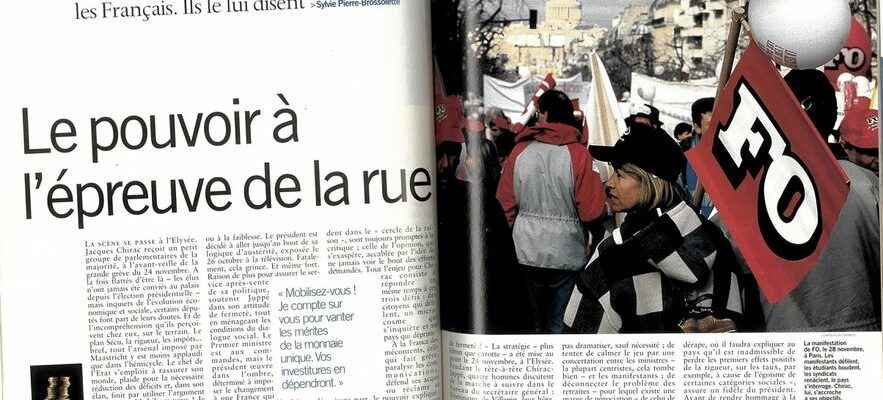For seven decades, our newspaper has covered and analyzed all the highlights of our contemporary history between decolonization, the Cold War, European construction, the advent of the Fifth Republic… It is committed to social struggles such as the abolition of the death penalty or the emancipation of women and welcomed great feathers like François Mauriac, Albert Camus or Jean-Paul Sartre. Turning the pages of our archiveswe invite you to relive the news of the past seventy years.
When one thinks of the major protest movements experienced by France after May 1968, one mobilization quickly comes to mind: the major strikes of autumn 1995. The “Juppé plan” intended to reform Social Security and the special pension schemes generated a gigantic protest movement that paralyzed France for three weeks.
In the aftermath of the demonstration of November 24, L’Express poses the challenges of the reform for Jacques Chirac freshly elected six months earlier “decided to go to the end of his logic of austerity”. Sylvie Pierre-Brossolette analyzes the situation: “The Prime Minister is in charge, but the president works in the shadows, determined to impose change on a France that is rearing.” There is no doubt that these words still resonate at the Elysée today.
L’Express of November 30, 1995
The power of the street
By lifting the taboo on Social Security, Jacques Chirac seduced the markets, not the French. They tell him.
The scene takes place at the Elysée. Jacques Chirac receives a small group of parliamentarians from the majority, two days before the big strike of November 24th. Both flattered to be there – elected officials have never been invited to the palace since the presidential election – but worried about economic and social developments, some deputies are expressing their doubts. And the misunderstanding they perceive at home, on the ground. The Social Security plan, rigour, taxes… in short, the whole arsenal imposed by Maastricht is less applauded there than in the hemicycle. The Head of State is working to reassure his people, pleads for the necessary reduction of deficits and, in his impetus, ends up using the strong argument: “Mobilize yourselves! I am counting on you to praise the merits of the single currency. Your nominations will depend on it.”
The social movement of 1995 in L’Express of November 30, 1995
© / The Express
Three-speed power
The demonstrators parade, the students sulk, the unions are reluctant, the country wonders. Chirac clings to his goals. No question of giving in to panic or weakness. The president is determined to go through with his logic of austerity, exposed on October 26 on television. Fatally, it squeaks. And even strong. All the more reason to ensure the after-sales service of its policy, to support Juppé in its attitude of firmness, while providing the conditions for social dialogue. The Prime Minister is in charge, but the President is working in the shadows, determined to impose change on a France which is rearing up and which, as an additional difficulty for power, is now working at three speeds: that of categorical interests, including defense led a section of the population to reject the reforms outright; that of the elites, who, while approving the return of the president to the “circle of reason”, are always quick to criticize; that of public opinion, which is becoming exasperated, overwhelmed by the idea of never seeing the end of the efforts required. The challenge for Chirac consists in responding to these three challenges at the same time: citizens marching, a worried microcosm and a depressed country.
To the France of the discontented, the one that strikes, paralyzes communications, defends its achievements or demands its fair share, the power explains: “Agreed to talk, much less to pay.” “Our leaders are in a maso trip, sighs an old friend of Chirac. They just have to stick to it. They already lack charm and enthusiasm. So let them show firmness!” The strategy – more stick than carrot – was developed on November 24, at the Elysée. During the Chirac-Juppé tete-a-tete, four men discuss the procedure to follow in the secretary general’s office: Dominique de Villepin, their host, Maurice Gourdault-Montagne, director of the cabinet at Matignon, Maurice Ulrich, special adviser to the President, and Jacques Pilhan, Chief Communications Officer.

A woman hitchhikes in Paris due to the lack of public transport due to strikes, November 30, 1995.
© / AFP
Decision is made not to dramatize, unless necessary; to try to calm the game by a consultation between the ministers – most of them centrists, that’s good – and the demonstrators; to disconnect the problem of pensions – for which there is room for negotiation – from that of Social Security – on which the authorities do not want to back down. Finally, to bring Juppé and Chirac up in line if the national interest required it.
“There is a time, if things go wrong, when it will be necessary to explain to the country that it is inadmissible to lose the first positive effects of rigor, on rates, for example, because of the selfishness of certain social categories” , assures a faithful of the president. Before paying tribute to the bravery of Nicole Notat. Proof that the front of refusals can be dented. Without giving up on the essentials.
Because the second France, that of the elites, will judge the government by the yardstick of its concessions. Politicians who are followers of a single thought, senior civil servants from all sides, financiers open to the world have welcomed Chirac’s turn and Juppé’s courage. The majority could only applaud, Jean-Claude Trichet make gestures, the observers wave their hats. Impossible to disappoint them.
But the lifting of taboos causes chain reactions which, if poorly controlled, destabilize the most determined powers. Already, Juppé’s mini-state of grace has faded. Opponents from within predict the failure of a government rejected by the base. Too left in the eyes of the right (liberals raise their heads), too right in the eyes of the left. “Our problem, agrees a hierarch of the RPR, is to admit that our arbitrations are socially fair.” Reforming without distributing is a challenge. Chirac knows it. But he has no choice, unless he loses all credibility.
Difficult, under these conditions, to seduce the third France, that of the citizens. These have the feeling of being the eternal cuckolds of history. They had been promised a reversal of logic, where employment would not be the enemy of the payroll.
Bitter disappointment, which is reflected in the polls: in the November Gallup-L’Express barometer, Jacques Chirac’s rating continues to fall, while the President-Prime Minister couple records a record level of discontent. The approval-disapproval balance is – 33 for the Head of State and – 35 for Alain Juppé. The president is more particularly let go by categories which had joined his campaign: the young people and the “little ones” (+ 20% of disapproval among the employees).
The faithful are reassured by affirming that the unpopularity of today manufactures the popularity of tomorrow. But, in the meantime, it mainly produces voters for Jean-Marie Le Pen: the National Front, according to the latest BVA-Paris Match study, obtains, in a legislative simulation, a worrying score: 15% of the vote.
The whole difficulty, for Jacques Chirac and Alain Juppé, consists in recreating the conditions of trust. Jacques Delors mocked them maliciously by launching: “The reduction of the deficits does not constitute a project.” To ward off the breakdown in morale which the French seem to be suffering from, it will indeed be necessary to mobilize them for a more positive purpose. Either Juppé manages to get through the turbulence and, in a few months, he will be able to describe a bright future. Either he fails, and then Philippe Séguin will undertake to propose another policy. On the eve of the presidential election, Jacques Chirac had confided his watchword: “Think only of 1998”! He had no idea how necessary it would be.
